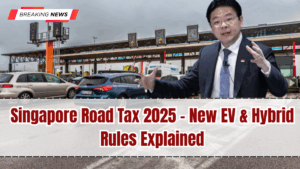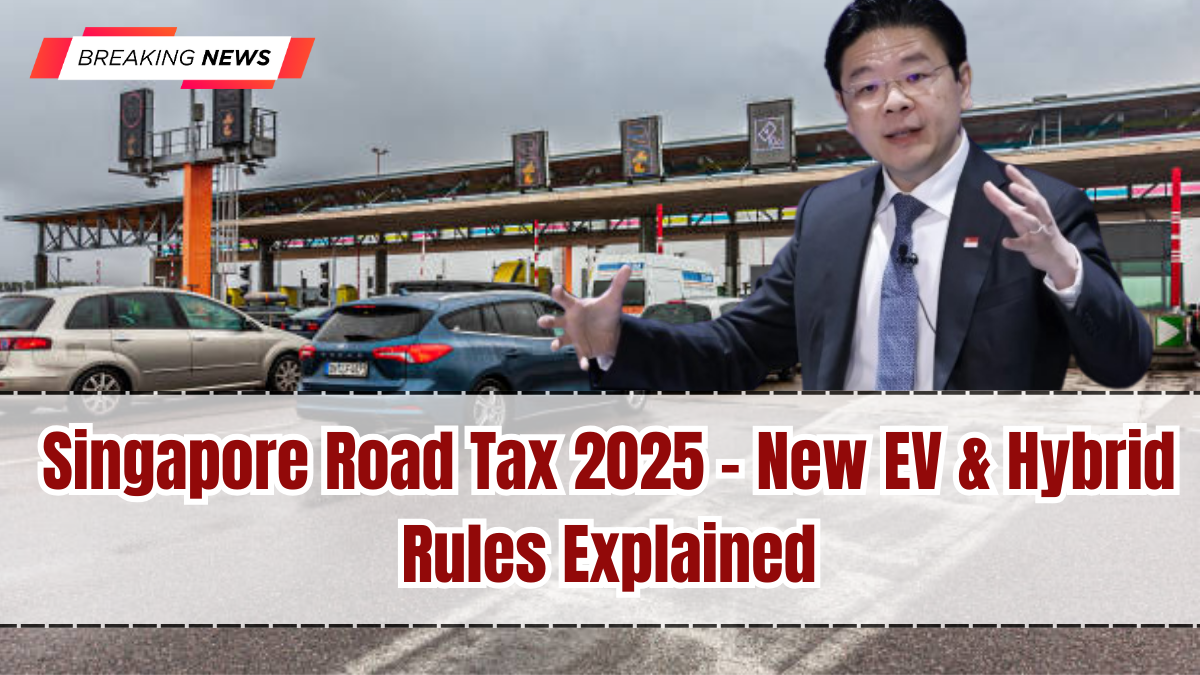The Singapore Road Tax 2025 update has introduced significant changes, especially for electric vehicles (EVs) and hybrids. As the country accelerates its transition toward green mobility, road tax policies are being recalibrated to ensure fairness, sustainability, and balance between traditional and electric vehicles.
For motorists, understanding these changes is critical. Road tax is not just another annual fee—it directly affects the affordability and long-term running cost of owning a car. With fuel prices high and COE premiums at record levels, the way road tax is calculated for EVs and hybrids could tip the scales for many buyers.
This article breaks down the new rules, explains how tax rates are applied, and explores what these updates mean for drivers, businesses, and the auto industry.

Why Road Tax Matters
Road tax has always been central to Singapore’s transport system. It generates revenue for road maintenance, regulates ownership costs, and encourages buyers to consider more efficient vehicles.
In the past, EVs often enjoyed reduced taxes to encourage adoption. But as their share of the market grows, Singapore is aligning policies to ensure road tax reflects fairness between different vehicle types.
Overview of Singapore Road Tax 2025 Changes
The government has revised the structure in three key areas:
-
Adjustment for Electric Vehicles
EVs now pay road tax based on power rating (kW) and battery capacity. Previously, the tax was mostly based on engine capacity equivalents. This new method is designed to be more accurate. -
Hybrid Cars
Hybrids, which combine petrol engines with electric motors, are now taxed differently depending on whether they are mild hybrids, plug-in hybrids, or full hybrids. This recognizes the varying levels of efficiency and environmental benefit. -
Commercial Vehicles and Buses
For fleets switching to electric vans or buses, a special rebate scheme has been introduced, offsetting part of the annual tax to encourage adoption.
Road Tax for Electric Vehicles in 2025
Under the new system, EV road tax is calculated using a base formula tied to electric motor output (kW).
-
Entry-level EVs (up to 90 kW): Around S$700–900 per year
-
Mid-range EVs (91–150 kW): Between S$1,000–1,400 per year
-
High-performance EVs (above 150 kW): Over S$2,000 annually
For example, the BYD Dolphin falls into the entry-level band, making it affordable to maintain, while a Tesla Model 3 Performance sits in the high-performance band, leading to higher road tax.
This shift ensures drivers of more powerful EVs pay proportionally more, just like petrol car owners with larger engines.
Road Tax for Hybrid Cars in 2025
Hybrids are now separated into clearer bands:
-
Mild Hybrids (engine-led, small electric assist): Road tax calculated mainly on engine size.
-
Full Hybrids (balanced petrol-electric systems): Receive slight reductions compared to petrol-only equivalents.
-
Plug-in Hybrids (larger battery capacity): Taxed partly on engine size and partly on battery output, with rebates applied.
This tiered structure rewards buyers who choose more efficient hybrid systems, aligning with Singapore’s sustainability goals.
Incentives and Rebates in 2025
To soften the impact of higher taxes for some EVs, the government has continued a few incentives:
-
Electric Commercial Vehicle Rebate: Up to S$5,000 annually for fleet operators.
-
First 3 Years EV Discount: New EV buyers get a 10% road tax discount for the first three years of ownership.
-
Green Vehicle Rebates: Hybrids with emissions below specific thresholds qualify for tax reductions.
These measures make the transition more attractive for both private owners and businesses.
Impact on Car Buyers
For everyday drivers, the Singapore Road Tax 2025 update means calculating ownership costs more carefully.
-
Small EVs like the BYD Dolphin remain affordable to maintain.
-
Mid-size EVs such as the Tesla Model 3 Long Range now incur higher annual costs compared to before.
-
Luxury EVs such as BMW iX or Porsche Taycan face the steepest tax increases.
For hybrids, the update encourages moving toward plug-in versions, as they receive more favorable rates compared to mild hybrids.
Impact on Businesses and Fleets
Logistics and ride-hailing companies stand to benefit most from the rebates. Switching to electric vans, minibuses, and taxis will save long-term fuel costs while also qualifying for road tax discounts.
However, businesses operating high-powered EVs, such as corporate fleets with luxury sedans, will see increased annual tax burdens.
Reactions from the Auto Industry
Car dealerships have welcomed the clarity in road tax rules, saying it helps customers understand long-term costs better. EV sales are still expected to grow strongly, especially for smaller models.
Some industry groups, however, argue that the new high-performance EV tax bands may discourage adoption among premium buyers. Others believe this aligns with Singapore’s equity principle, ensuring bigger, more powerful cars contribute more to road revenue.
Long-Term Outlook
The road tax structure will likely continue evolving. Analysts expect Singapore to eventually adopt usage-based taxation, such as distance-based road pricing, to replace or supplement annual taxes.
For now, the Singapore Road Tax 2025 update reflects a balancing act: keeping EVs attractive, ensuring fairness, and generating stable revenue as petrol cars phase out.
Conclusion
The Singapore Road Tax 2025 rules reshape how EVs and hybrids are taxed, introducing a more nuanced, output-based system. For smaller EVs and efficient hybrids, costs remain manageable, while larger and more powerful vehicles now face higher charges.
With rebates for fleets and incentives for green vehicles, the government is clearly steering Singaporeans toward sustainable choices. For car buyers, the message is simple: owning an EV or hybrid is the future, but calculating total costs—including road tax—is now more important than ever.
FAQs
How is EV road tax calculated in 2025?
It is based on the electric motor output (kW), with higher-powered EVs paying more annually.
Do hybrids pay less road tax now?
Yes, especially plug-in hybrids, which receive rebates. Mild hybrids, however, are closer to petrol cars in tax rates.
What incentives exist for EV buyers?
Rebates of up to S$20,000 on purchase remain, and EVs get a 10% road tax discount for the first three years.
How much does a small EV like the BYD Dolphin pay in road tax?
Around S$700–900 per year, making it one of the cheapest EVs to maintain in Singapore.
Will road tax keep increasing in the future?
Possibly. Analysts expect Singapore may eventually shift to distance-based road pricing to replace or adjust road tax.
Click here to know more.
